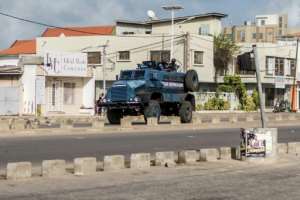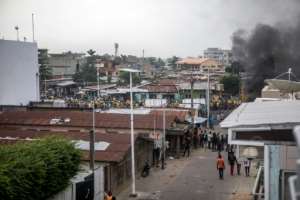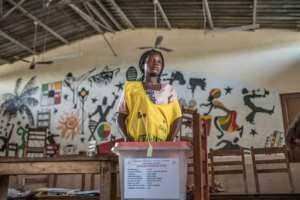
[ad_1]
Calm seemed to return to Benin late Thursday after two days of post-election violence in which at least two people died, the final results of the parliamentary polls being published.
"The participation rate … was 27.1%," announced the president of the Beninese Constitutional Court, Joseph Djogbenou, higher than the 23% of the publication of the preliminary results.
"Given the irregularities and disturbances (during the vote), these are still not likely to compromise the validity and transparency of the vote," said Djogbenou, close to President Patrice Talon.
The violence erupted Wednesday shortly after the announcement of provisional results of Sunday's vote that was held without a single opposition candidate.
Boni Yayi, president from 2006 to 2016, and Nicephore Soglo, who served from 1991 to 1996, urged Talon to cancel the vote, which they describe as a "coup d'etat".
Earlier, soldiers had fired shots as they were repressing the second day of angry protests.
A large number of soldiers and riot police, as well as hundreds of demonstrators armed with barricades on fire, gathered in the streets of the economic capital of Benin, Cotonou.
A witness said three people were killed Thursday as soldiers opened fire and a video seen by AFP showed soldiers firing as protesters fled.
"The police and soldiers (…) started shooting, they sued people," said one resident. "We heard gunshots, a lot of gunshots."
A woman died Thursday after being injured the day before, medical sources said. A man was taken to the hospital with a gunshot wound on his back.
In Kandi City, about 620 kilometers to the north, a young man was also shot dead Wednesday night by soldiers.
"They targeted it," said the victim's father to AFP. "The bullet went through it, my child is dead."
The protests began a few hours after the first results released Wednesday revealed record attendance at Sunday's election.
Thursday, the soldiers deployed in force.

"They made a brutal incursion," said a witness, a family member of former president Thomas Boni Yayi, who had called for a boycott of Sunday's poll and whose home became the center of events.
"They fired bursts of bullets," said the witness.
Interior Minister Sacca Lafia told French Radio RFI that some officers "opposed the orders given" and that the guilty parties would be sentenced to "the most severe penalties".
"Democracy is precious"
Protesters chanting slogans against President Talon burned shops, threw stones and gas bombs, and smashed the windows of government buildings.
Police fired tear gas to disperse the crowd and protesters tried to throw some of the cans.
"Talon … will not be able to kill our democracy," said a protester.

"Democracy is precious to us, Beninese people," said another. "That's why we protested."
One of the country's largest cotton factories – an area in which Talon made his fortune before going into politics – was burned down.
"The protesters set the factory on fire," said a firefighter. "Everything burned."
The UN envoy for West Africa, Mohamed Ibn Chambas, met with regional leaders and officials in Benin to ensure "a peaceful solution," the press spokesman told reporters on Thursday. UN word, Stéphane Dujarric, in New York. security forces."
"We are following the situation in Benin closely," Dujarric said.
"We note with concern the ongoing tension and unrest, which has resulted in the destruction of property and the brutal reaction of the security forces."
"Repression"
The new eligibility criteria prevented opposition parties from running in the parliamentary elections last Sunday.

Opposition leaders asked people not to vote and preliminary results showed that more than three quarters of the five million registered voters in the country had responded to the call.
"The people demand the return of democracy," Boni Yayi told reporters on Monday, calling on the population to resist the outgoing president. "Talon will walk on our bodies."
Events in the small state of West Africa have resulted in warnings from civil society and human rights groups in Benin and elsewhere.
Before the vote, Amnesty International said that a "wave of arbitrary arrests of political activists and journalists and the crackdown on peaceful protests" had reached an "alarming level".
After a meeting of ministers Thursday afternoon, the Beninese government stressed the "professionalism" of the security forces in their efforts to maintain public order.
Large contingents of police and army were still stationed in Cotonou on Thursday night, blocking access to Yayi's residence.
Source link